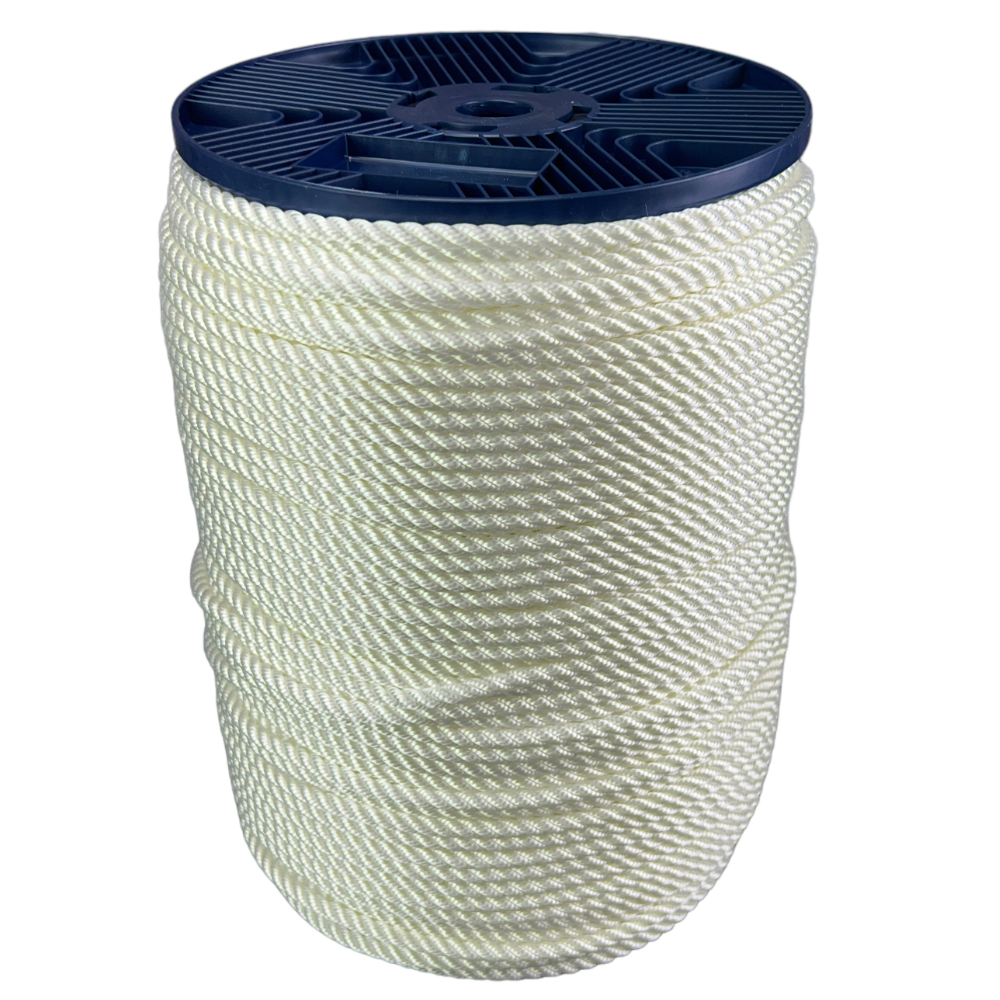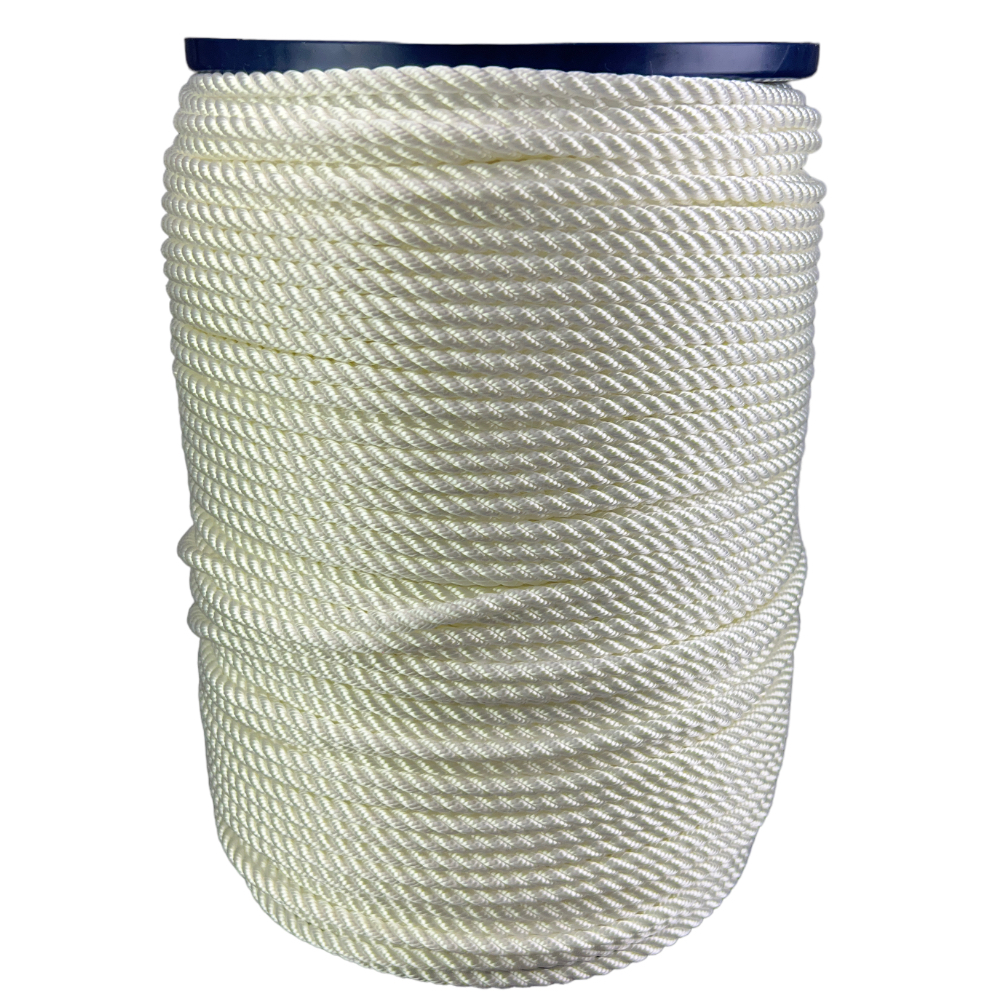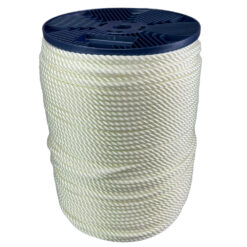6mm White Polyester Rope x 100 Metre Reel
£50.00
6mm White Polyester Rope x 100 Metre Reel
Discover the strength and durability of our 6mm white polyester rope, a versatile and reliable choice for various applications. Crafted with precision for the demanding needs of the marine industry, this polyester rope shares similar physical properties with Nylon Rope, constructed from high-quality yarns. Finished on a reel.
Our polyester 3 strand rope boasts minimal stretch, making it ideal for applications where shock loading absorption is not a priority. Its excellent resistance to abrasion and UV sunlight ensures longevity, providing you with a rope that remains strong whether wet or dry.
With an approximate break load of 600 Kg’s, this rope is perfect for a range of marine uses, including general working lines, slinging, lifting, pulley work, and moorings, this 6mm white polyester rope delivers consistent performance in diverse conditions. Its water absorption and sinking properties make it suitable for marine environments, and it maintains equal strength whether wet or dry.
Count on this polyester rope for its resilience against UV exposure and abrasion, ensuring reliability in challenging conditions. While it excels in resisting acids, be mindful of potential vulnerability to alkalis. Plus, unlike some counterparts, this rope won’t shrink when wet, offering stability and consistency in your applications.
Invest in the superior quality of our 6mm white polyester rope – the perfect solution for marine enthusiasts and professionals seeking durability, versatility, and lasting performance. Order your 100-metre reel today and experience the strength of reliable polyester rope for your specific needs.
| Diameter | Max Length Per Reel | Approx Weight Per Coil | Approx Breaking Load |
|---|---|---|---|
| 8mm | 220 Metres | 11.00kg | 1,070kg |
| 10mm | 220 Metres | 16.50kg | 1,650kg |
| 12mm | 220 Metres | 24.20kg | 2,340kg |
| 16mm | 220 Metres | 44.00kg | 4,060kg |
| 20mm | 220 Metres | 66.00kg | 6,070kg |
Please note that all weights and breaking loads provided are approximate. The breaking loads may vary depending on how the rope is finished. It is imperative to subtract 10% from the breaking load for each splice made in the rope. Additionally, please be aware that weights can fluctuate, particularly with natural products, due to differences in manufacturing processes and materials utilised.
Synthetic Rope and Its Properties
Synthetic rope is made from man-made fibers such as nylon, polyester, polypropylene, and polyethylene. These ropes are known for their high strength, durability, and resistance to various environmental factors. Unlike natural ropes, synthetic ropes do not absorb water, making them ideal for use in wet and outdoor environments. However, synthetic ropes have their own set of characteristics and considerations that you should be aware of.
Behavior in Wet Conditions
One of the key advantages of synthetic ropes over natural ones is their minimal water absorption. Synthetic ropes generally do not shrink or expand when exposed to moisture, making them highly reliable in marine, industrial, and outdoor applications. However, while they do not absorb water, some synthetic ropes may become slippery when wet, which can affect handling and knot-holding capabilities.
Effects of UV Exposure
Unlike natural ropes, synthetic ropes are resistant to rot and mildew, but they can be affected by prolonged exposure to UV rays. Over time, UV exposure can weaken the fibers, causing the rope to degrade and lose strength. To mitigate this, synthetic ropes can be treated with UV inhibitors or stored out of direct sunlight when not in use.
Resistance to Chemicals and Abrasion
Synthetic ropes are generally more resistant to chemicals and abrasion compared to natural ropes. For instance, nylon and polyester ropes are highly resistant to various oils, acids, and alkalis, making them suitable for harsh industrial environments. Additionally, these ropes have excellent abrasion resistance, which means they can withstand rough surfaces without significant wear.
Elongation and Stretch
Different types of synthetic ropes have varying degrees of elongation. For example, nylon rope is known for its elasticity, which allows it to absorb shock loads without breaking. This makes nylon rope ideal for dynamic applications such as climbing, towing, and mooring. On the other hand, polyester rope has low stretch, making it suitable for applications where maintaining tension is critical.
Care and Maintenance
To extend the lifespan of synthetic ropes, it’s important to follow proper care and maintenance practices. Regularly inspect the rope for signs of wear, abrasion, or UV damage. If the rope shows significant signs of wear, such as fraying or thinning, it should be replaced to ensure safety and performance.
Storage Considerations
When storing synthetic ropes, keep them in a cool, dry place, away from direct sunlight and chemicals. Coiling the rope properly and avoiding tight bends can also help prevent kinks and maintain the rope’s integrity.
Summary
Synthetic ropes offer numerous advantages over natural ropes, including resistance to water, rot, and chemicals. They are durable and strong, making them suitable for a wide range of applications. However, it’s important to be aware of their susceptibility to UV damage and to take appropriate measures to protect the rope from prolonged exposure. By properly maintaining and storing synthetic ropes, you can ensure their longevity and reliable performance in various conditions.










